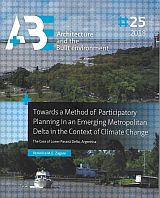 | On 17 October 2018 Veronica Zagare, Delta Alliance Wing coordinator Argentina defended her thesis: Towards a Method of Participatory Planning in an Emerging Metropolitan Delta in the Context of Climate Change
The Case of Lower Paraná Delta, Argentina >> Read more |
Abstract
The Parana River is the third largest river in the American continent, after the Mississippi and the Amazon. Instead of flowing directly to the sea, it flows to the Rio de la Plata (located between Argentina and Uruguay) through a complex delta system. This delta is a large and heterogeneous territory that spreads over three provinces of Argentina and that is characterized by different dichotomies along its extension. On the one hand, the islands of the delta are young alluvial lands in constant transformation due to the processes of sedimentation, and are subjected to pulses of floods influenced by the Paraná River streamflow, droughts, precipitations and strong southeastern winds coming from the Atlantic Ocean.
Although these alluvial territories seem to be pristine, they have been moderately altered as a result of the development of economic activities. On the other hand, along the edges of the delta, we find the older territories of the mainland, created in the Pleistocene and less dynamic. Here is a network of cities of dissimilar sizes, that establishes the wealthiest corridor of the country. Conurbations such as Rosario (located in the province of San ta Fe) and the Metropolitan Area of Buenos Aires (located in the homonym province), exert different pressures over the territory, generating an increasing impact on the delta system. In other words, this delta shows a contrast between the wild and dynamic condition of the islands and the more stable but strongly urbanized edges. Nevertheless, this dichotomy is not the only one that can be found in the delta. On the contrary, there are other oppositions regarding economic, policy and social realms, expressed through a polarized, unsustainable and unplanned land use, which turns the area into a vulnerable place, given the uncertain context of climate change.
Citation
Zagare, V. (2018). Towards a Method of Participatory Planning in an Emerging Metropolitan Delta in the Context of Climate Change: The Case of Lower Paraná Delta, Argentina A+BE | Architecture and the Built Environment DOI: 10.7480/abe.2018.25